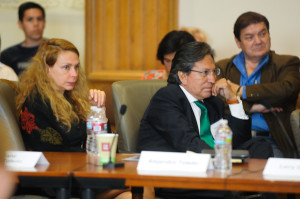“There is a high correlation between poverty and ethnicity,” said Alejandro Toledo, former president of Peru, at an all-day conference Tuesday in Encina Hall. “It’s not a coincidence that the poorest people in Latin America are indigenous or Afro descendants. That is why I think the initiative of this conference has an enormous application. It is not just an academic exercise — it’s very concrete.”
Toledo, who served as Peru’s president from 2001 to 2006, gave the opening address at a conference titled “Human Rights of Indigenous Peoples in Latin America,” which sought to explore how the conditions of indigenous people in the region can be improved.
Toledo began by examining the economic situation of Latin America and discussing how despite overall economic growth, the poverty gap between the indigenous and the wealthy continues to swell.

“One of the greatest advantages that I think Latin America has is our cultural diversity,” he said. “That cultural diversity is not our weakness. It’s our strength.
“If we are able to build on that, then we can create a cohesive society, reduce social conflict and provide sustainability for economic growth,” Toledo continued. “And the income we derive from that growth, we can invest it in the minds of our people.”
His wife, Elaine Karp-Toledo, an anthropologist and economist, expanded on the indigenous culture and way of life in an afternoon presentation. She discussed why and how indigenous people should be involved with their local and national governments.
“We propose that social inclusion and equal citizenship are key factors for good governance,” Karp-Toledo said. “The indigenous worldview has to be respected and integrated in public policies.”
According to Karp-Toledo, the modern press and media unfortunately continue to produce negative images of the indigenous, portraying them as less-civilized people who cannot recognize improvements or what is best for them. She said this makes it more difficult for them to be taken seriously by their governments.
Audience member Diana Martin, a Palo Alto resident, said she was intrigued by the concept of involving the indigenous in modern education and markets.
“There’s a feeling of bringing the indigenous into the corporate culture if you educate them,” Martin said. “But if you’re teaching them to use computers and cell phones, it’s a dilemma because you could destroy their traditional culture.”
Nadejda Marques, manager of the Program on Human Rights, initially proposed the idea of the conference. Marques said she feels that the issues surrounding the indigenous population in Latin America are applicable around the world, including in the United States, where Native Americans have to fight for sovereignty.
“Providing information and creating awareness is definitely one of the conference’s goals, but we also wanted to create momentum for researchers on indigenous rights and that’s not necessarily specific to Latin America” Marques said. “It’s both multi-disciplinary and transnational.”
Throughout the day, there were five panel sessions of two to four speakers who each published papers on the conference theme. The panels presented various aspects of the issue such as indigenous child health, property rights and the indigenous relationship with climate change.
The Center on Democracy, Development, and the Rule of Law partnered with the Program on Human Rights and the Center for Latin American Studies and Students for a Sustainable Stanford to organize the event. The Program on Human Rights plans to post the academic papers of the event speakers on its website.